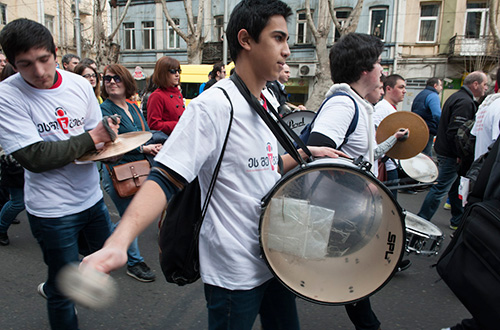| Commentary: Civic Activism to Counterweigh Election Results |
| Civil Georgia, Tbilisi / 2 Nov.'16 / 21:56 Erekle Urushadze |

The elections are now over, and their results reflect the reality: that the Georgian Dream (GD) today has more supporters than any other party.
At the same time, the proportion of that support is by no means reflected by the distribution of mandates in the new parliament. GD does not have support of the three-fourths of the voters that went to the polling stations, and even less so of all Georgian voters.
It is therefore clear, that the current system of elections cannot fairly reflect the voters’ will.
In 2012-2016 we have witnessed a rare occasion in Georgia’s independent political history, when the ruling party had no constitutional majority in the parliament. Thus the power was not fully concentrated in one hands, at least compared to previous administrations.
This has created small islands of institutional independence, for example at the courts and in the media.
Nonetheless, the intent of the GD to concentrate political power the same way that its predecessor, the United National Movement did, was clear throughout these four years. Pressure on courts and on independent media outlets served as an expression and a testimony of such intent.
Clearly, after 2016 elections, GD has achieved its objective. The relatively pluralistic and free environment that we have enjoyed during the past four years is now endangered.
Despite that threat, it is also clear that there are clear differences between 2016 and 2004, when UNM consolidated its hold on power.
Yes, the political opposition is still weak and fragmented, but civil society is much stronger and more diverse than it was back in 2004. Alongside institutionalized NGOs, which remain a backbone of Georgia’s organized civil society and that grew stronger in the past years, now we also have many informal groupings and movements that are driven by highly motivated volunteer activitsts.
The penetration and influence of the social media has also grown considerably, complicating the control over information.
Politically, the government also faces external constraints. Georgia is not Russia or Azerbaijan. The ruling party has declared its “European Choice” and is dependent on its Western partners for political and financial support. Hence, the potential for establishing an openly authoritarian or repressive government in Georgia is much more limited than elsewhere in the neighborhood.
Consequently, despite the degree of concentration of power in a single political force, considerable safe space will remain available for civic activism in Georgia.
More civic activism, higher engagement of citizens in country’s civil, social and political life is the only appropriate response to the results of these elections. One active citizen can often achieve more, than ten moneybags in MP seats.
Erekle Urushadze is programme manager for anti-corruption policy and reforms at Transparency International Georgia and a civil activist involved in advocacy for better urban policies in Tbilisi. Opinions expressed in this article are his own and do not reflect the position of Transparency International or any other agency.
